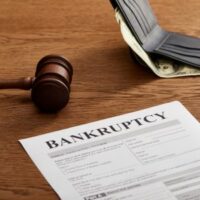What Can Cryptocurrency Holders Do If Their Exchange Files For Bankruptcy?

Recent news concerning cryptocurrency and cryptocurrency exchanges has focused on the possibility of crypto bankruptcies. Indeed, although crypto exchanges at one time appeared to be allowing investors to earn significant profits, the value of cryptocurrency has plunged and many crypto exchanges and firms are turning to bankruptcy. As a recent article in Forbes underscores, as crypto markets shift, investors and customers “are wondering how protected they will be in the event of collapse of a crypto exchange.” Such concerns are significant given that many crypto exchanges do not have clear policies concerning ownership and what customers can do in the event of a bankruptcy filing. To learn more about options for cryptocurrency customers, it is important to understand how the exchanges work and what kinds of steps customers can take in the event of an exchange bankruptcy.
How Crypto Exchanges Work
To understand options that customers might have when a crypto exchange files for bankruptcy, it is necessary to be clear about how these exchanges work and what role they play in buying and selling cryptocurrency. According to Georgetown Law School professor Adam Levitin, a cryptocurrency exchange “provides custodial services for its customers.” To be clear, the exchange is a digital platform that allows people to buy and sell cryptocurrency, functioning as an intermediary between buyers and sellers. Exchanges can be centralized or decentralized. Centralized exchanges, according to Intuit, use third parties to conduct transactions, while decentralized exchanges use blockchain technology or distributed ledgers instead of a third party.
When a customer buys cryptocurrency through one of the exchanges, that person can either keep the crypto in the exchange or can move the cryptocurrency to the customer’s crypto wallet. When an exchange files for bankruptcy, what happens to the cryptocurrency it is holding? And what options does a customer have?
Cryptocurrency Exchanges Are Not Savings Institutions and Do Not Have Protections for Customers
When customers rely on custodial wallets available through cryptocurrency exchanges, the customer does not fully own or have complete control over their cryptocurrency assets. As an article in Currency.com explains, citing Bitstamp, “a third party will hold and manage your private keys on your behalf . . . . [Y]ou won’t have full control over your funds, nor the ability to sign transactions.”
When customers of banks put money in the bank, they have protections through the Federal Deposit Insurance Corporation (FDIC), and owners of securities have protections through the Securities Investor Protection Corporation (SIPC). In short, crypto customers do not have guarantees. Since crypto exchanges are not banks or savings institutions, customers do not have those protections. In addition, since a crypto exchange is not a bank, it can file for bankruptcy. When it does, it is likely that any custodially held cryptocurrency is the property of the bankruptcy estate.
What Can Customers Do?
Since the automatic stay will initially stop customers and other creditors from redeeming any cryptocurrency held by the exchange that has filed for bankruptcy, customers could ask the bankruptcy court to lift the automatic stay. However, there is no guarantee that this will work, and it is important for customers to know that they are likely to be classified as unsecured creditors who do not have priority in a bankruptcy case. As such, customers likely should not expect the automatic stay to be lifted. Rather, customers will need to wait until secured creditors are repaid, which could take years.
According to a report from CNBC, it is possible that customers who used crypto exchanges that keep customer money in FDIC-insured accounts could have some protection, but the law is not clear.
If your crypto exchange has not yet filed for bankruptcy, you may be able to take steps to protect your assets, such as moving your crypto into a “self-custody wallet.” You may have options, but the matter of customer rights in crypto exchange bankruptcies is largely uncharted territory for now.
Contact a Bankruptcy Lawyer in West Palm Beach
If you have questions about your crypto assets in the event of an exchange bankruptcy, you should get in touch with a West Palm Beach bankruptcy lawyer at Kelley Kaplan & Eller today.
Sources:
forbes.com/sites/nizangpackin/2022/07/15/bankruptcy-and-crypto/?sh=3abccca17df5
creditslips.org/creditslips/2022/02/what-happens-if-a-cryptocurrency-exchange-files-for-bankruptcy.html
mint.intuit.com/blog/investments/what-is-a-cryptocurrency-exchange/
cnbc.com/2022/07/19/what-happens-to-my-funds-if-a-crypto-exchange-goes-bankrupt.html



